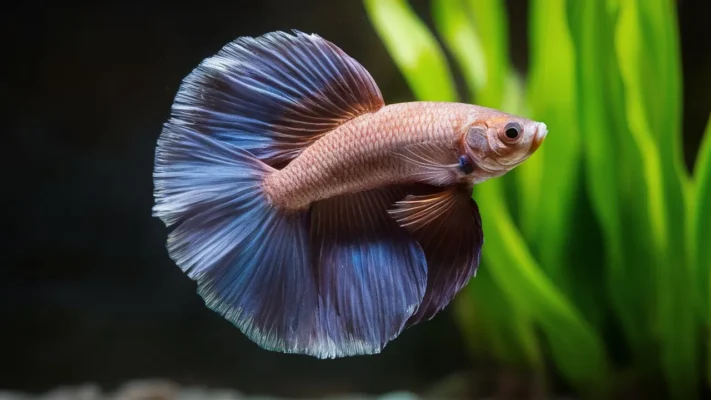Betta fish, also known as Siamese fighting fish, are a popular choice among aquarium enthusiasts. While these vibrant and graceful creatures generally thrive in captivity, they can sometimes experience health issues like constipation. Constipation in bettas can be a concerning condition that requires prompt attention and proper treatment.
What Is Betta Fish Constipation?
Constipation in betta fish occurs when the digestive system becomes blocked, preventing the normal passage of waste. This can happen due to a variety of factors, such as overfeeding, improper diet, or stress. When a betta fish is constipated, it may exhibit symptoms like a swollen or pinecone-like appearance, loss of appetite, and difficulty defecating.
How To Treat Betta Fish Constipation?

Causes Of Betta Fish Constipation
There are several common causes of Betta fish constipation, including:
Overfeeding
Feeding your Betta fish too much or too often can lead to constipation. Bettas have a small stomach, and overfeeding can cause a blockage in their digestive system.
Improper Diet
A diet lacking in fiber or high in protein can also contribute to constipation in Betta fish. It’s important to provide your Betta with a balanced diet that includes a variety of high-quality foods.
Stress
Stress is a potent factor contributing to digestive issues in Betta fish, often manifesting as constipation. A multitude of stressors, including suboptimal water conditions, the presence of aggressive tank mates, or abrupt environmental changes, can disrupt the delicate balance of the fish’s digestive system. When Betta fish experience chronic stress, their physiological functions, including digestion, can be compromised, leading to constipation and associated health problems. It’s crucial to provide a calm and stable environment to mitigate stress and promote optimal digestive health in these captivating aquatic companions.
Underlying Health Issues
Constipation can sometimes be a symptom of a more serious underlying health issue. While often attributed to dietary or lifestyle factors, persistent constipation may signal the presence of an organ disease or parasitic infection. It’s essential to recognize that constipation can be a manifestation of abroader health problem and seek professional medical evaluation if the condition persists or is accompanied by other concerning symptoms.
Symptoms of Betta Fish Constipation
When a Betta fish is constipated, they may exhibit a variety of symptoms, including:
- Lethargy and loss of appetite
- Bloated or “pinecone” appearance
- Difficulty passing waste
- Visible constipation or impaction in the digestive tract
- Floating or sinking to the bottom of the tank
- Behavioral changes, such as hiding or aggression
If you notice any of these symptoms in your Betta fish, it’s important to address the issue promptly.
Treating Betta Fish Constipation
If your betta fish is showing signs of constipation, it’s important to take action quickly to address the issue. Here are some effective methods for treating betta fish constipation:
1. Fasting
One of the first steps in treating betta fish constipation is to fast the fish for 24-48 hours. This allows the digestive system to rest and can help clear any blockages.
2. Epsom Salt Bath
Epsom salt can be a valuable tool in treating betta fish constipation. Prepare an Epsom salt solution by dissolving 1 teaspoon of Epsom salt per gallon of dechlorinated water. Gently place the betta in the solution for 10-15 minutes, repeating this process for 2-3 days.
3. Pea-Based Diet
Introducing a pea-based diet can help alleviate constipation in bettas. Boil a pea, remove the skin, and mash it up into a paste. Feed this to your betta in small amounts, gradually reintroducing their regular diet over the following days.
4. Increased Water Changes
Maintaining good water quality is crucial for betta health, and increasing the frequency of water changes can be beneficial for a constipated betta. Perform 25-50% water changes every 2-3 days to help flush out any waste buildup.
5. Aquarium Tannins
Adding Indian almond leaves or driftwood to your betta’s tank can release beneficial tannins that can help soothe the digestive system and promote regular bowel movements.
Remember, it’s important to monitor your betta closely during the treatment process and consult with a veterinarian if the condition persists or worsens.
Preventing Betta Fish Constipation
To prevent betta fish constipation, consider the following tips:
- Feed a balanced, high-quality diet: Provide a varied diet that includes both pellets and freeze-dried or frozen foods, such as brine shrimp, bloodworms, and daphnia.
- Avoid overfeeding: Feed your betta small, frequent meals and never exceed the recommended feeding amounts.
- Maintain optimal water conditions: Ensure the tank is well-cycled, with appropriate water parameters and regular water changes.
- Reduce stress: Provide your betta with a calm, stable environment, free from excessive noise, bright lights, and aggressive tank mates.
By understanding the causes and implementing effective treatment and prevention strategies, you can help your betta fish overcome constipation and maintain a healthy, happy life.
Conclusion
Betta fish constipation is a common problem, but with proper care and treatment, it can be effectively managed. By understanding the causes with information of Betta Fish 247, symptoms, and effective treatment methods, you can help to keep your Betta fish healthy and happy. Remember to always provide your Betta with a balanced diet, maintain good water quality, and be attentive to any changes in their behavior or appearance.

Related Posts
Female Betta Care: A Comprehensive Guide
Understanding Betta Fish Water
What Are Clamped Fins On Betta?